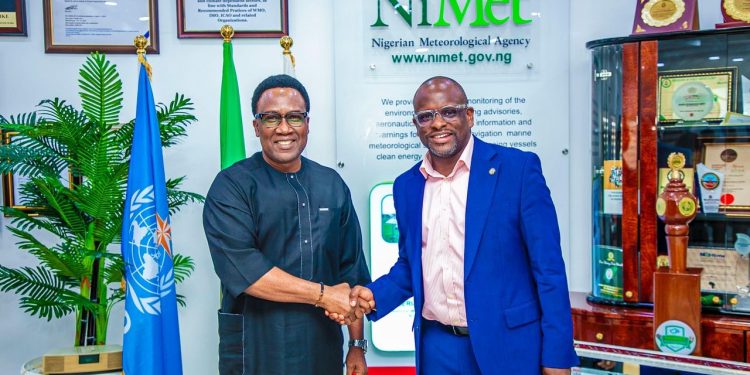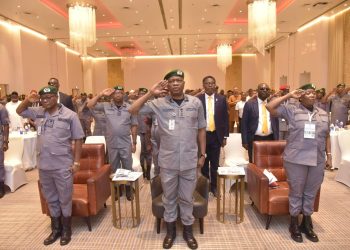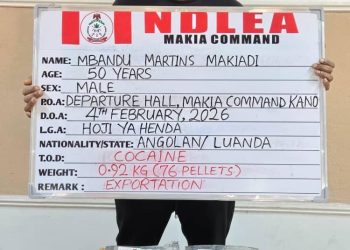By Nkechi Eze
In a decisive step toward enhancing the safety, efficiency, and climate resilience of Lagos State’s growing water transport sector, the Nigerian Meteorological Agency (NiMet) and the Lagos State Waterways Authority (LASWA) have opened discussions on a strategic partnership that would integrate real-time meteorological intelligence into ferry operations and waterways management.
The proposed collaboration was the focus of a high-level meeting held today at NiMet’s headquarters in Abuja, where the Director-General of the agency, Professor Charles Anosike, received a delegation from LASWA led by its General Manager, Mr. Oluwadamilola Emmanuel, during a courtesy visit.
Both parties explored avenues for real-time integration of NiMet’s weather and climate data into LASWA’s operational planning framework to enable more informed decisions regarding ferry scheduling, water safety protocols, route optimization, and emergency preparedness. The overarching goal of the initiative is to develop a climate-smart ferry operation system that is responsive to Nigeria’s evolving weather patterns and the increasing demand for water-based mobility in Lagos, Africa’s most populous city.
According to Professor Anosike, the collaboration aligns with NiMet’s mandate to provide weather and climate services for safety and sustainable development across all sectors of the Nigerian economy. He noted that Nigeria’s inland waterways, particularly in Lagos where ferry commuting is on the rise, must be supported with tailored meteorological services to minimize weather-induced accidents, enhance commuter confidence, and strengthen transport resilience against climate shocks.
“Waterways transport remains a viable and growing sector in our urban mobility landscape. What we are building here with LASWA is a pathway to climate-smart navigation, one that ensures operators and commuters are empowered with reliable, location-specific weather updates and advisories in real time,” Anosike stated.
He assured LASWA of NiMet’s readiness to deploy its vast meteorological expertise and technological infrastructure to support water transport systems across the country, beginning with Lagos. He also emphasized the importance of capacity building for transport operators and ferry crew members on how to interpret and respond to weather forecasts and alerts, particularly during the peak rainy and harmattan seasons, when maritime visibility and safety are often challenged.
On his part, Mr. Oluwadamilola Emmanuel described the visit as timely and strategic, coming at a moment when Lagos is deepening its commitment to safer, more efficient, and environmentally sustainable public transportation systems. He commended NiMet for its expanding role in supporting various sectors with actionable climate intelligence and stressed that the waterways sector must not be left out.
“As we continue to expand our ferry network and water transport capacity, integrating meteorological data into our systems is no longer a luxury, it is a necessity. This is how we can ensure that our operations are safer, better timed, and less disrupted by weather events. It is also how we protect lives,” Emmanuel said.
He disclosed that LASWA is working to improve not just the physical infrastructure of ferry terminals and vessels, but also the digital and operational tools that drive daily decision-making. According to him, weather-informed scheduling and dynamic routing will significantly reduce delays, cancellations, and emergencies, while boosting commuter confidence in using ferries as a reliable mode of transportation.
During the discussions, both organisations agreed on the need to institutionalize the partnership through the signing of a formal Memorandum of Understanding (MoU), which would clearly define roles, responsibilities, data-sharing frameworks, and training programmes. The MoU is expected to pave the way for the development of customized weather products for the Lagos waterways, daily forecast dissemination protocols for operators, and joint emergency response drills to prepare for extreme weather events.
Both NiMet and LASWA also highlighted the importance of public awareness in achieving the desired outcomes of the partnership. They underscored the need to sensitise ferry passengers, boat operators, and terminal staff on the value of weather information and how to act on it, particularly during heavy rainfall, thunderstorms, and foggy conditions which often impair navigation and endanger lives.
Additionally, the agencies touched on the broader implications of the collaboration for national climate adaptation planning, especially as Nigeria grapples with the growing impact of climate change on its coastal and inland water systems. With Lagos being particularly vulnerable to sea level rise, coastal flooding, and high-intensity rainfall, the integration of science-backed weather services into urban mobility systems could set a new benchmark for resilient infrastructure planning in other coastal states.
The meeting concluded with a shared commitment to accelerate the technical and administrative groundwork necessary to activate the partnership, beginning with the drafting and signing of the MoU in the coming weeks.
As Lagos continues to position itself as a smart megacity with multimodal transport options, this alliance between NiMet and LASWA promises to not only modernize ferry operations but also demonstrate how inter-agency cooperation, grounded in science and innovation, can improve public service delivery and protect lives in a climate-vulnerable environment.















